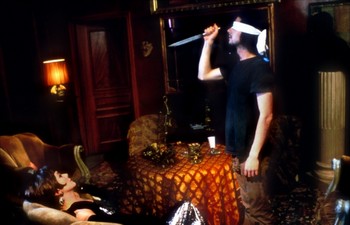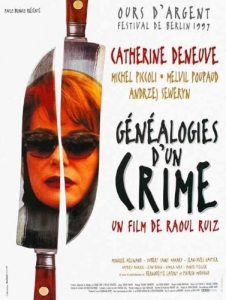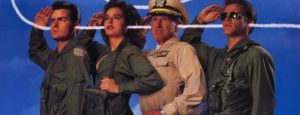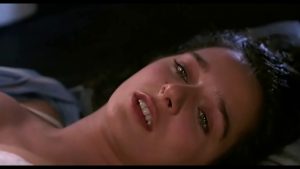From the Chicago Reader (June 1, 2000). — J.R.

A failure, but an endlessly fascinating one. Between making his only SF film (The Damned) and his first successful art movie (The Servant), blacklisted expatriate Joseph Losey directed this 1962 film, adapted by Hugo Butler and Evan Jones from a James Hadley Chase novel, about a washed-up Welsh novelist of working-class origins (Stanley Baker) who unsuccessfully pursues a high-class hooker (Jeanne Moreau) while effectively driving his wife (Virna Lisi) to suicide. The film is pretentious and plainly derivative; I’ve always regarded as unwarranted and philistine Pauline Kael’s ridicule of Antonioni, Resnais, and Fellini in an article of the period called “The Come-Dressed-as-the-Sick-Soul-of-Europe Parties”, but she might well have included Losey’s film, with its clear debt to all three. It’s a painful testament of sorts (Losey himself can be glimpsed in a bar during a pan that also introduces the hero, showing his personal stake in the proceedings from the outset), though it makes wonderful use of locations in Venice and Rome and features an excellent jazz score by Michel Legrand (with a pivotal use of three Billie Holiday cuts). A decadent period piece and a sadomasochistic view of sexual relations, this singular, resonant, and at times even inspiring mannerist mess is far more interesting than a good many modest successes. Read more
From the July 1, 1998 Chicago Reader. — J.R.

An uncharacteristically somber and mainly straightforward 1997 drama by prolific Chilean-born French postsurrealist Raul Ruiz (Three Lives and Only One Death). Catherine Deneuve plays a defense lawyer whose young client (Ruiz standby Melvil Poupaud) has murdered his aunt. (The aunt had belonged to a psychoanalytic group that believed criminal tendencies form by the age of five, an issue prominently debated throughout the film.) Over time the young man begins to associate the defense lawyer with his dead aunt while she identifies him with her dead sona relationship that grows even stranger once the two become lovers. The film has strong performances by Deneuve and Poupaud as well as by Monique Melinand (as the lawyer’s mother), Michel Piccoli (as the head of a psychoanalytic group), and Bernadette Lafont. Beautifully shot and relatively concentrated for Ruiz — who usually prefers to ramble, constructing baroque visual tangents to his fictions — it delivers the sting of a sharp novella. (JR)
 Read more
Read more
From the August 2, 1991 Chicago Reader. — J.R.

For my money, this is funnier than both Naked Guns combined, even down to the final joke-strewn credits. Putatively a parody of Top Gun, it also includes send-ups of Dances With Wolves, Full Metal Jacket, The Fabulous Baker Boys, Superman, and even Gone With the Wind. Directed and cowritten (with Pat Proft) by Jim Abrahams, one of the three writer-directors who launched Airplane!, this shares more with that 1980 laugh getter than an exclamation point and Lloyd Bridges; there’s also much of the same pleasure in milking cliches and ridiculing poker-faced straight men with their own compliance (Charlie Sheen is every bit as well cast here as Leslie Nielsen is in the Naked Gun movies), and the airborne antics are realized with a lovely sense of craft. With Cary Elwes, a very sexy Valeria Golino, Kevin Dunn, Jon Cryer, William O’Leary, Kristy Swanson, and Efrem Zimbalist Jr. (Webster Place, Ford City, Bricktown Square, Burnham Plaza, Golf Mill, Lincoln Village, Water Tower)
 Read more
Read more





